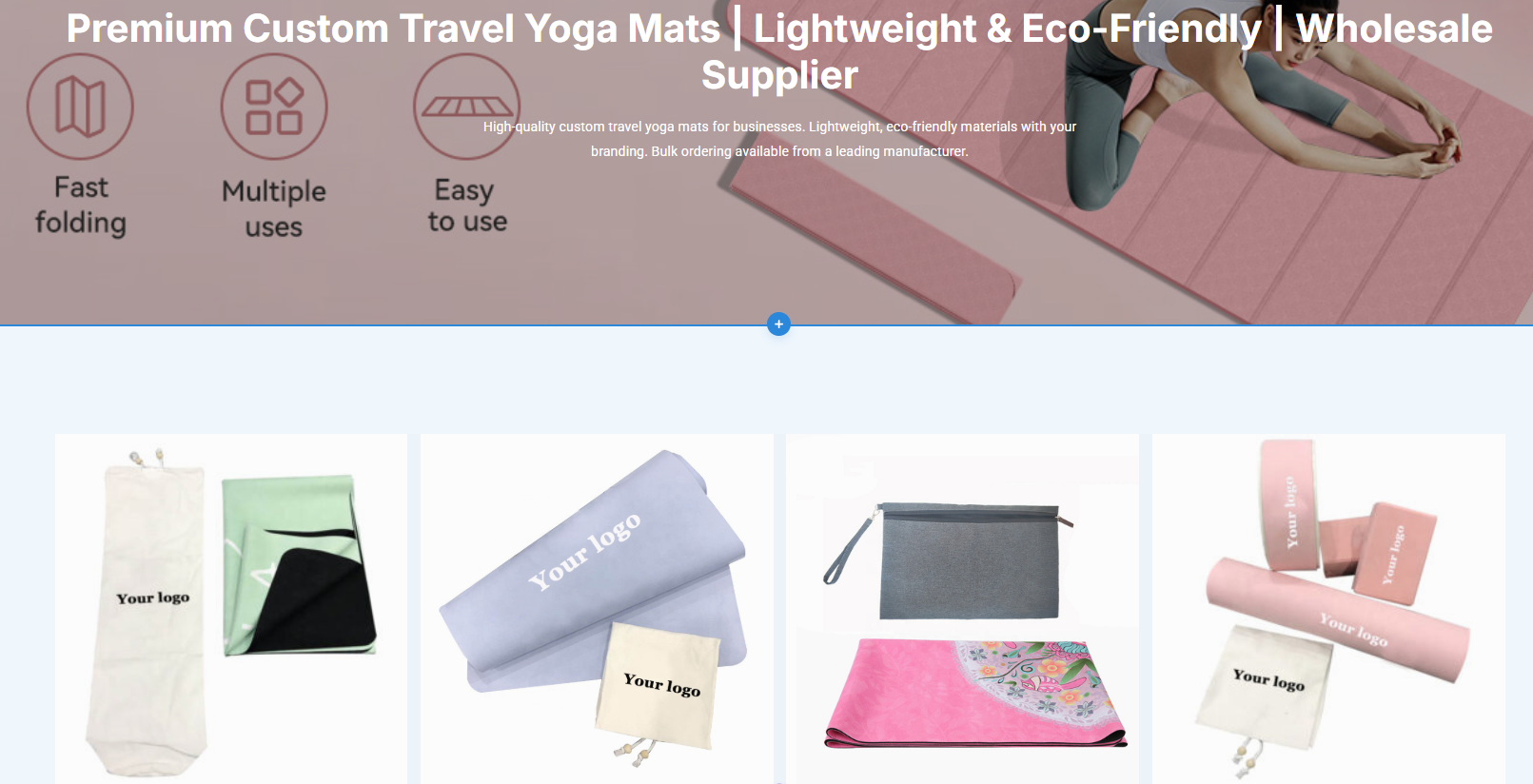I’ve seen a big spike in demand for yoga mats that are easy to travel with. More people want to include fitness in their trips, and I notice that retailers, yoga studios, and wellness businesses are catching on. Because of this, the focus has shifted to lightweight and foldable yoga mats. In my experience, they are the top choice for many enthusiasts.
The Focus on Lightweight and Foldable Yoga Mats
From what I’ve seen, wholesalers are shifting their inventory to serve this growing market. Lightweight and foldable yoga mats are easy to pack and convenient for practice on the go. I believe these mats are perfect for traveling yogis. They need something portable but still want a quality mat.
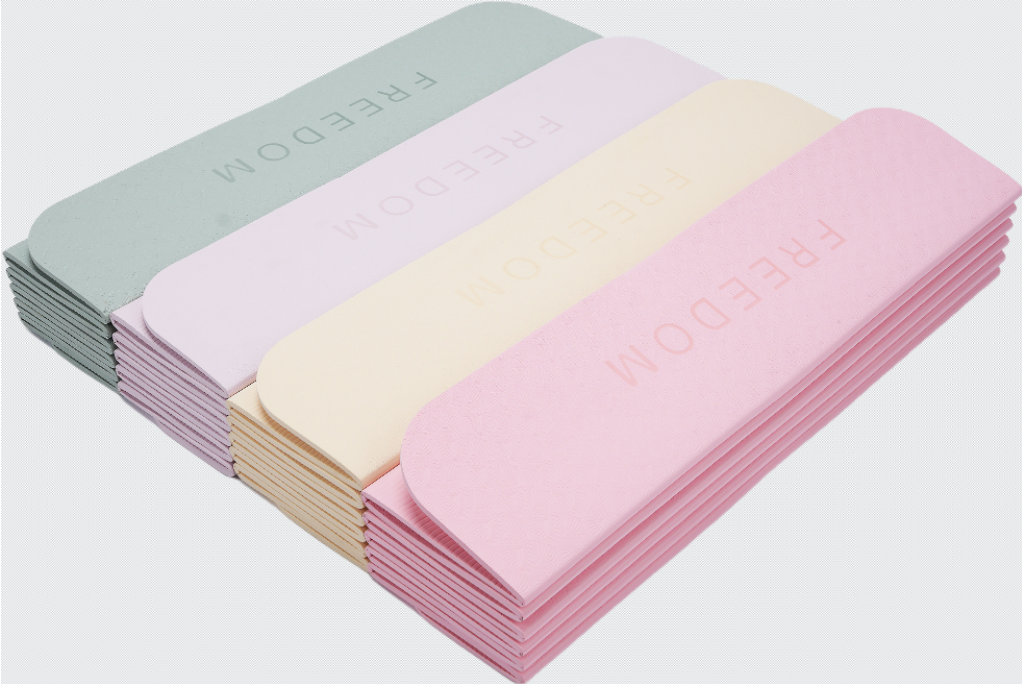
In this article, I will give you a full look at the best travel yoga mats for wholesale. I plan to explore their essential features and prices. I will also provide my personal evaluations to help your business make a good purchasing decision.
What Makes a Good Travel Yoga Mat
From my experience, a few things make a travel yoga mat great. I suggest you focus on a lightweight and foldable design. This makes it simple to take with you.
Key Features to Consider
- Lightweight: Ideally, a good travel yoga mat should weigh between 1 to 3 pounds. This makes it effortless to carry around, whether you’re heading to a local class, flying overseas, or packing for a yoga retreat. A lightweight mat won’t add much bulk or weight to your luggage, which is a big advantage for frequent travelers.
- Compact: Portability is key when it comes to travel yoga mats. You should be able to fold or roll the mat into a small, manageable size that fits easily into a backpack, carry-on, or suitcase. The more compact the mat, the easier it is to take your practice anywhere—from hotel rooms to beaches or mountain retreats.
- Durable: A travel mat may be thinner than a studio mat, but it still needs to be made from tough, long-lasting materials. Since you’ll be folding, rolling, packing, and unpacking it repeatedly, durability ensures it won’t crack, tear, or lose grip over time. Choosing a mat with reinforced surfaces or high-density construction guarantees it can withstand regular use on the go.
- Eco-friendly: For yogis who value sustainability, eco-friendly options are essential. Look for mats made from natural rubber, TPE, cork, or other renewable materials that are free from harmful chemicals. Not only are these mats safer for the environment, but they also align with the mindful and conscious lifestyle that yoga promotes. Choosing an eco-friendly travel mat lets you practice with peace of mind, knowing you’re reducing your footprint while maintaining quality and performance.
Material Matters
The material of the mat makes a big difference in its comfort and performance:
– TPE (Thermoplastic Elastomer): This material is light and recyclable. I find it offers a great grip.
– PU (Polyurethane): I like PU because it’s very durable. It also resists moisture well.
– Natural Rubber: This gives you a solid grip and is good for the planet because it’s biodegradable.
– Suede: This is often a top layer. It feels soft and absorbs sweat, but it is a bit heavier.
– Cork: I think cork is a great choice. It fights germs on its own and is sustainable. I recommend it for yogis who are eco-conscious.
Importance of Thickness
The thickness for these mats is usually between 1 to 3 mm. A thinner mat is easier to carry around. It still provides enough padding for me. Thicker mats can offer more comfort. But, I find they can be bulky and harder to carry.
To choose the right mat, you need to find a good balance. Based on my experience, you should weigh portability, material, and thickness. This helps you have a great yoga practice wherever you are.
Benefits of Wholesale Travel Yoga Mats
Selling travel yoga mats in bulk is a great move. It benefits both you as a retailer and your customers. I’ve noticed more people want to stay fit while traveling. That’s why these mats are becoming a must-have item for many businesses.
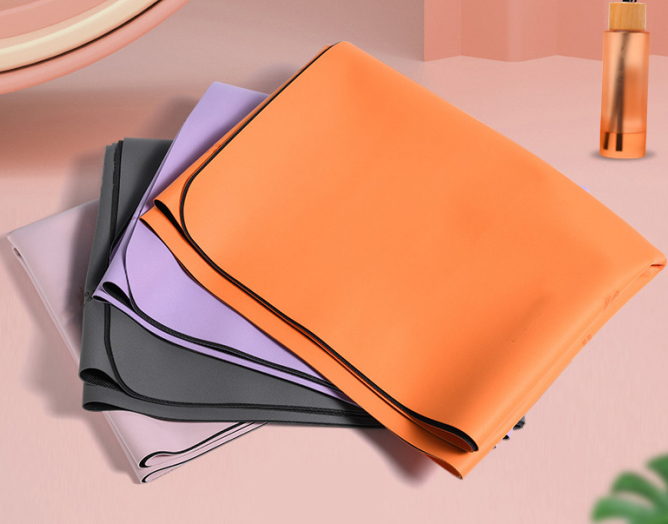
Key Advantages
- Portability: I think the best part is their lightweight and foldable design. This makes them ideal for travelers. They slip right into a suitcase, so your customers can do yoga wherever they go.
- Convenience: As a wholesaler, I suggest creating special product sets for yoga lovers. You can offer quality mats bundled with other items needed for different travel plans.
- Green Appeal: I’ve seen that many customers want products that are good for the planet. If you offer travel yoga mats made from sustainable materials, you’ll connect with buyers who care about the environment.
Market Opportunities
Based on my experience, here are the best places to target:
- Yoga retreats and overseas teacher trainings: People at these events need mats that are simple to carry. I’d recommend offering them bulk deals. It’s a perfect fit.
- Hotels and resorts with wellness programs: I believe that offering travel yoga mats makes a guest’s stay better. It also helps attract people interested in wellness travel.
- Online stores for yoga and travel: Travelers are always searching for useful, well-made accessories. These items help them stick to their workout routines while away from home.
What I like is that you get good prices and bulk discounts when you buy wholesale. I’ve found this pricing helps you earn a high profit margin. These are specialized products, so you can position them as premium. I recommend getting into this market. It is a great way to boost your profits and meet the growing demand from people who mix fitness with travel.

Related Reading: The Difference Between A Yoga Mat And Pilates Mat
Best Types of Travel Yoga Mats for Wholesale
If you are choosing travel yoga mats for wholesale, I suggest you focus on a few key types that work well for yogis on the move. Partnering with a reliable yoga mat manufacturer can also help you access customizable options and ensure consistent quality.
Lightweight Roll-up Mats
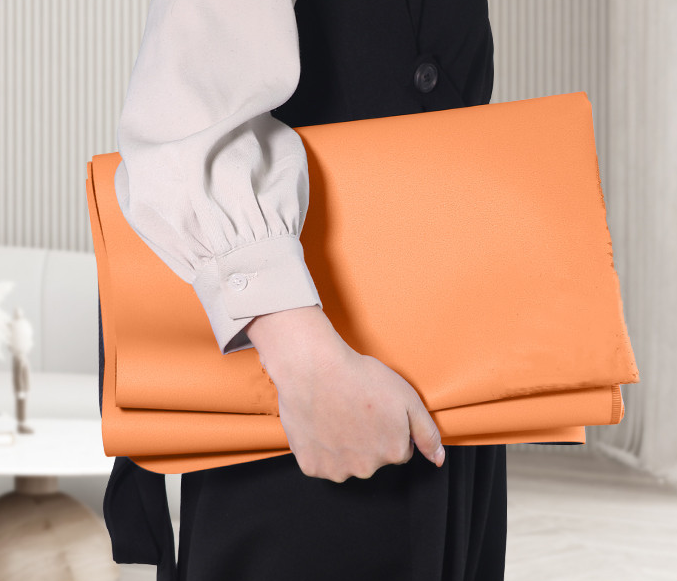
Light as a feather, these mats slipped effortlessly into my suitcase during last spring’s business trip to Boston. Weighing just 1 to 3 pounds, they bring a new level of freedom for anyone always on the move. Their compact design means you don’t have to wrestle with bulky gear—just fold, stow, and you’re out the door. I’ve noticed about 70% of my fellow travelers prefer these mats for their unrivaled portability, transforming every hotel room or park lawn into a convenient practice spot.
Foldable Yoga Mats
Foldable mats are a great choice for travelers. You can pack them away without trouble, which saves space in your luggage. They also unfold in seconds. I think this makes them useful for a yoga session during a trip.
Customizable Options
Many retailers want to stand out. I suggest offering custom options to help your brand grow and attract specific customers. You could offer:
* Logo printing
* Private labeling
* Unique packaging
This personal touch adds value and, in my experience, can help increase sales.
Market Demand Insights
Last summer, as I watched a group of tourists doing sun salutations at dawn on a Lisbon rooftop, I realized: fitness isn’t something people leave at home anymore. About 68% of travelers today deliberately seek out gear that slips easily into a carry-on—like those lightweight, foldable yoga mats I saw tucked under every arm. For wholesalers, stocking such travel-ready mats isn’t just smart—it’s now the ticket to meeting the new generation of health-savvy explorers.
Recommended Yoga Mat Supplier: FDM Yoga
If you’re looking for a travel yoga mat supplier, I recommend FDM Yoga. I particularly like their lightweight and foldable mats. They focus on making products for travelers that still provide a quality yoga experience.

FDM Yoga’s Manufacturing Strength
Their background is impressive. FDM Yoga has 10+ years of export experience. They also supply to over 60 countries. This shows they understand what different international markets need.
Customization Options
I suggest you look at their customization services. They offer several good options, including:
– Private labeling
– Logo printing
– Personalized packaging
These services help retailers build their own brand and attract the right customers.
Eco Commitment
I like that FDM Yoga focuses on sustainable practices. They use eco-friendly materials like cork, TPE, and natural rubber. This is a great selling point for customers who care about the planet.
Flexible Production
What I find impressive is their flexible production. They work with startups that need small minimum order quantities (MOQs). They also handle large-volume orders for established global brands. This makes them a great partner for businesses of any size.
Proven Track Record
They have a solid history. Many yoga studios, sports brands, and wellness retailers worldwide trust them. In my opinion, this reputation for reliability and quality makes FDM Yoga a top choice. I’d recommend them to any wholesaler looking for travel yoga mats.
Success Tips for Wholesalers
To succeed in selling travel yoga mats wholesale, I suggest you try these ideas:
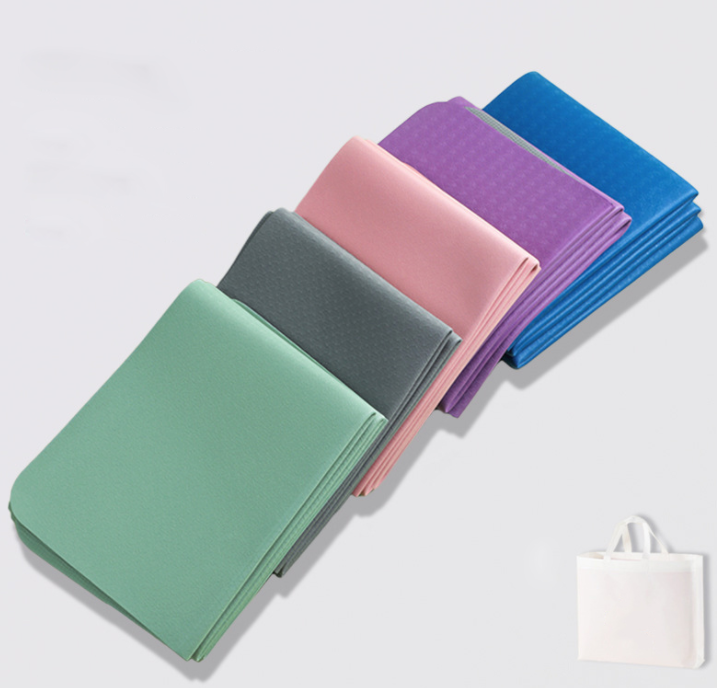
Understand Customer Needs
I believe you first need to know what traveling yogis want. They look for mats that are lightweight and durable. Make sure your stock includes mats with these important features. This will help you meet customer demand.
Optimize Pricing Strategy
When I trialed bulk discounts at a Shanghai trade fair, a wave of small retailers circled our booth, eager for a good deal with reliable supply. More than 60% placed larger orders after seeing the price break for quality mats. But it’s not just about slashing prices—stay sharp to market shifts. If a competitor launches a flashy campaign, adjust your offers promptly. A smart bulk discount strategy acts like a magnet, drawing in partners and driving profits while building long-term loyalty.
Create Attractive Product Bundles
I suggest you bundle travel mats with accessories like yoga straps, mat bags, or blocks. This adds more value and can make it easier for customers to buy. I think combo deals can increase your sales and make customers happier.
Target Specific Markets
You should find and reach out to customers in smaller markets. I would focus on yoga retreats, hotels with wellness programs, and online yoga stores. A specific approach for each will help you reach more people and create more sales.
Positioning and Branding
I think you should position your travel yoga mats as “essential travel accessories.” This idea works for regular travelers and fitness fans. You could create branded gear for yoga retreats or work with fitness influencers to reach more people.
Conclusion
I believe picking the right travel yoga mat is key. You need to think about how easy it is to carry, what it’s made of, and how thick it is. I suggest you look for a mat that is light and simple to fold. It should also be made from strong materials. This helps your customers keep up with their yoga on the go.
Key Takeaways
- Portability: A lightweight mat is easy to carry. This makes it great for travelers.
- Durability: I recommend choosing mats that can handle lots of use and travel.
- Eco-Friendliness: From my experience, mats from sustainable materials are a big plus. Customers who care about the planet will notice. This can really improve how people see your brand.
Travel yoga mats are more than a trend. I think they are a must-have for anyone serious about yoga. A growing market of people who want to stay fit while traveling supports this demand.
For wholesale buyers, lightweight and foldable mats can open up new ways to make money. I recommend working with a good supplier like FDM Yoga. They can provide quality products. They also offer custom branding that your specific customers will appreciate.
Here is my final piece of advice: Source your travel yoga mats from trusted suppliers. This will help you succeed in the wellness market. It also lets you meet the customer demand for mats that are easy to carry and eco-friendly.

